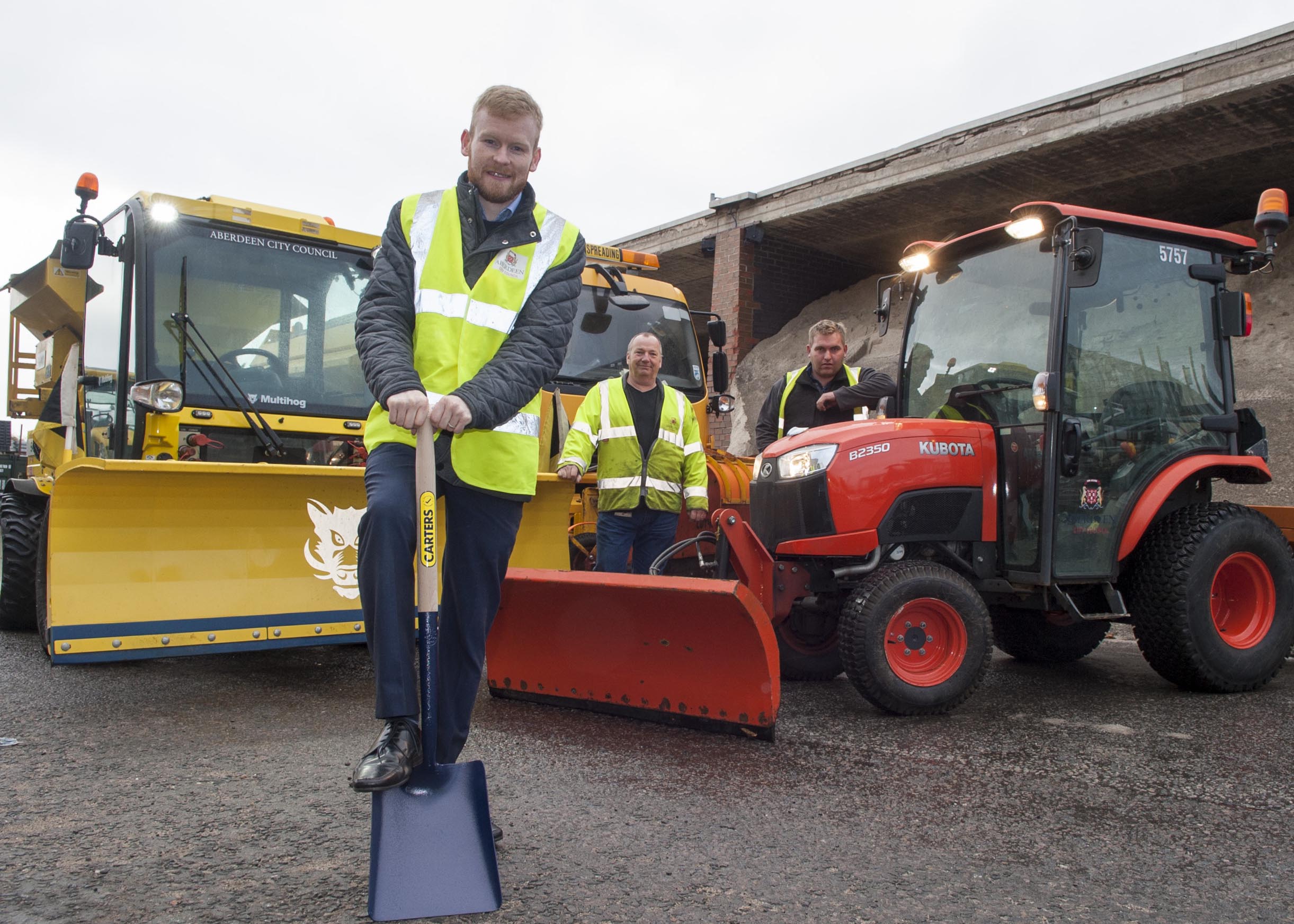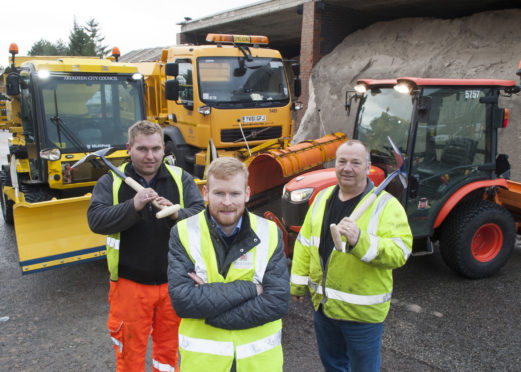A stockpile of 11,726 tonnes of salt, about 180 staff, half of the city’s roads treated before 7.30am, and new big community salt bins are just some of the ways Aberdeen City Council is prioritising this year’s winter maintenance.
The City Council today launched its 2018/19 winter maintenance campaign including outlining priorities for gritting roads and pavements, details of planned operations and how much grit/salt is in stock.
The local authority has previously approved a budget for winter and emergencies of £1.73million to ensure that the city keeps moving. That sum might not be all used, or can go over, depending on the severity of the winter.
Early morning and standby gritting operations start 16 November until 20 March although gritters have already been out several times in the last few weeks with the colder nights. Operations will be extended if road conditions and forecasts are showing wintry weather.
Almost half (47%) of Aberdeen’s roads will be treated before 7.30am, with 560 miles of roads in the city, slightly more than the distance from Aberdeen to London. Weather forecasts are closely monitored throughout the day and night, and gritters and ploughs can be out 24/7.
Aberdeen City Council transport spokesman Councillor Ross Grant said: “We’re hoping it will be a mild winter but the Scottish climate means there’s always a possibility of snow and ice, as we saw several times last winter.

“This year, we have nearly 12,000 tonnes of salt along with about a total of 180 staff and dozens of road and pavement gritters so our staff and equipment are ready for winter and are as prepared as they can be.
“Our dedicated staff often go above and beyond their duty to help people and I am heartened by the many stories we hear of them helping people when the weather is particularly bad.
“They do their best under often difficult winter conditions and our early morning gritter drivers are usually driving to work themselves on untreated roads before they start work at 4.45am to ensure the main roads are gritted before 7.30am.
“Whilst we cannot be everywhere at the same time, we recognise how willing residents in our communities are to help so in recent years, in addition to the existing 900 yellow grit bins, we have created more opportunities to enable residents who want to do their bit for their local community including the popular one-tonne community salt bags and this year we are introducing big community salt bins at locations around the city.
“We’d ask residents to be prepared themselves, by carrying out journey planning, ensuring they have the right equipment for their journeys, and having an alternative plan for transport if possible.”
The primary routes which are treated first are the main transport routes through the city and include major bus routes, roads at Aberdeen Royal Infirmary, and roads near fire stations. The primary routes make up almost half of Aberdeen’s roads network,and are never impassable unless there are abnormal conditions. These are gritted early morning from 4.45am to 7am as the early morning gritting operations, to ensure they are salted before rush hour.
The primary routes are pre-treated, and there is 24/7 availability of equipment/crews.
>> Keep up to date with the latest news with The P&J newsletter
The secondary routes comprise of significant through-routes in communities, and are treated only treated once the primary roads are open to traffic. Roads that carry medium traffic flows or give access to community or public facilities of a non-urgent nature and secondary routes on higher ground are usually a priority.
Secondary routes include roads near sheltered housing and social work properties, near schools where possible, cemeteries and crematoria, shopping centres, and access to facilities in parks and gardens.
The other roads are all other routes which are not normally treated unless emergency vehicles require access, there is a medical emergency or funeral, and they include minor roads where road users can make their way to the nearest higher priority route, local access roads, and cul-de-sacs.
The other roads are only gritted after the primary and secondary routes are open to traffic, and it should be noted experience has shown primary and secondary routes are usually the only routes which are gritted during periods of bad weather.
The priority 1 pavements are in the city centre, and get high usage, and include two routes. The other pavements include all other footways which are treated on area basis, with a priority given to high usage and public facilities or access. Cycleways are treated as priority 2 footways.
Aberdeen City Council resources include:
- About 180 staff including 90 roads maintenance staff, plus an extra 90 parks and grounds staff who carry out much of the pavement gritting, especially near sheltered housing, schools and hospitals;
- Seven dedicated road gritters with snow plough attachments;
- 14 demountable road gritters with snow plough attachments;
- Four large gritters;
- 21 pavement gritters with snow plough attachments;
- A de-icer applicator vehicle. De-icing fluid is only used if temperatures drop low enough to stop salt working;
- 11,726 tonnes of salt in stock. Grit and sand are not used unless the temperatures are too low for salt to work. Grit and sand also block gutters which can cause additional problems.
This year, we have new big community salt bins at 14 locations around the city with more locations to be confirmed. In addition, residents were encouraged to apply for a one-tonne community salt bag before the cut-off date of 1 November, and there are also about 900 grit bins around the city for residents’ use.
For operations, Aberdeen City Council has a robust plan which also ensures the authority and drivers comply with legislation.
This includes health and Safety requirements, a maximum of 10 hours driving, compliance with the Working Time Directive, a minimum of three drivers per route to provide cover the rota, a capability to cover four routes at any time of day or night using the response squad, sufficient standby staff to cover 10 priority road routes and two pavement routes at night and weekends, and early morning starts to cover 10 priority carriageway routes.
